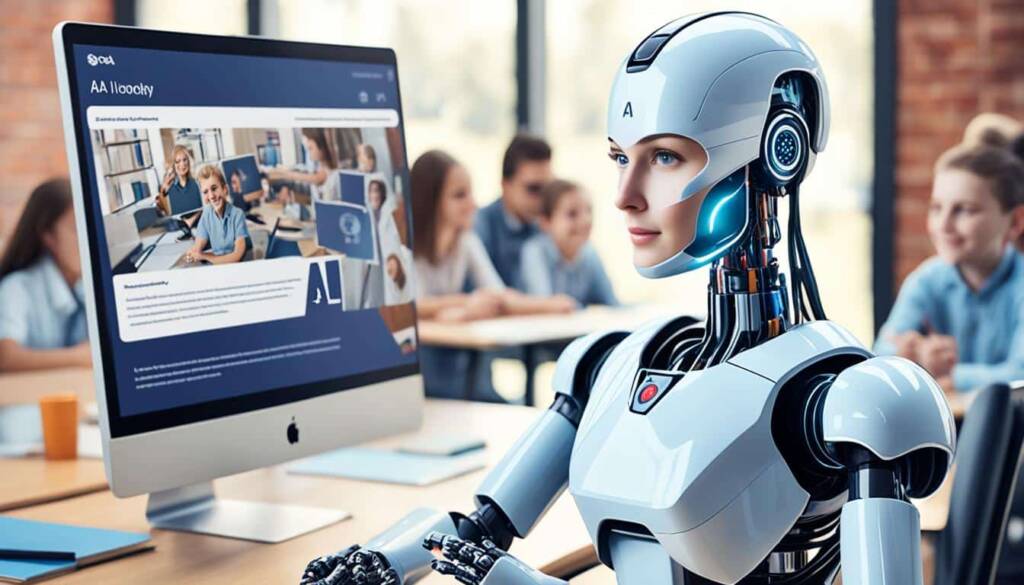Table of Contents
The use of artificial intelligence (AI) in education delivery and assessment is revolutionising the way students learn and teachers teach. AI technology, including machine learning algorithms, is being integrated into various aspects of education to enhance learning experiences and improve student outcomes. AI-powered tools for teaching and student assessment are being developed and implemented, providing personalised and adaptive learning experiences, automating certain tasks, and offering advanced data analytics.
This section explores the impact of AI in education delivery and assessment, highlighting the benefits and potential of integrating AI in educational practices. It also provides an overview of AI-enabled education platforms and AI-driven learning systems that are transforming the education landscape.
The Impact of AI in Education Delivery
The impact of AI in education delivery is significant and multifaceted. AI technology is transforming the way students learn and teachers teach, offering numerous benefits and opportunities for personalized and adaptive learning experiences.
AI-powered tools leverage machine learning algorithms to analyze vast amounts of data on students’ learning patterns and preferences. This allows educators to gain valuable insights and tailor instruction to meet each student’s individual needs and learning pace. By providing personalized content, interactive exercises, and recommendations for further learning, AI enables a more engaging and effective learning experience.
Moreover, AI streamlines the assessment process by automating tasks such as grading, reducing the burden on teachers and providing immediate feedback to students. This not only enhances efficiency but also allows for timely intervention and support. With AI-enabled student assessment, educators can gain a deeper understanding of students’ knowledge and progress, enabling targeted instruction and personalized feedback.
Overall, the integration of AI in education delivery enhances student engagement, improves learning outcomes, and empowers educators with data-driven insights to optimize instruction. By harnessing the power of AI, educators can provide tailored learning experiences that cater to the unique needs of each student, fostering a more inclusive and effective educational environment.
Benefits of AI in Education Delivery
AI technology offers several benefits in education delivery:
- Personalized learning: AI enables tailored learning experiences based on students’ individual needs and learning styles.
- Adaptive learning: AI-powered tools can adapt instruction in real-time, catering to students’ changing abilities and progress.
- Efficient assessment: AI automates the assessment process, allowing for timely feedback and intervention.
- Data-driven insights: AI analyzes data to provide valuable insights for educators, facilitating targeted instruction and personalized support.
AI in education delivery enhances student engagement, improves learning outcomes, and empowers educators with data-driven insights to optimize instruction.
The next section will explore AI tools for teaching and student assessment, further highlighting the benefits and impact of AI in education.
AI Tools for Teaching and Student Assessment
The field of education is undergoing a transformation with the development and implementation of AI tools for teaching and student assessment. AI-powered educational platforms and learning management systems are leveraging machine learning algorithms to provide tailored and adaptive learning experiences. By analyzing students’ learning data and preferences, these platforms offer personalized content, interactive exercises, and recommendations to enhance their learning journey.
AI tools for teaching not only benefit students but also assist educators in creating engaging and interactive lessons. They automate administrative tasks, facilitate communication and collaboration among students, and free up valuable time for educators to focus on instruction and support. These AI-powered tools empower teachers to deliver personalized education that caters to each student’s unique needs and learning pace.
Furthermore, AI solutions for student assessment have revolutionized the evaluation process. They automate grading, providing efficient and accurate results while also offering immediate feedback to students. With AI-powered assessment, educators gain valuable insights into students’ performance and progress. This enables them to identify areas in which students may need additional support and tailor their instruction accordingly.
Overall, the integration of AI tools in teaching and student assessment enhances the effectiveness and efficiency of the education process. With AI-powered educational platforms, personalized learning experiences become a reality, helping students reach their full potential. Moreover, adaptive learning with AI allows educators to deliver tailored instruction, ensuring that every student receives the support they need to succeed in their academic journey.
FAQ
What is the impact of AI in education delivery?
AI technology in education delivery has a significant impact by enabling personalized and adaptive learning experiences, automating tasks such as grading, and providing valuable insights for educators to tailor instruction and interventions.
How does AI enhance student assessment?
AI solutions for student assessment automate grading, provide immediate feedback, and generate insights on students’ performance and progress, making evaluation more efficient and accurate.
What are AI tools for teaching?
AI tools for teaching include machine learning algorithms that assist educators in creating engaging lessons, automating administrative tasks, and facilitating communication and collaboration among students.
How do AI-powered educational platforms enhance learning?
AI-powered educational platforms leverage machine learning algorithms to provide personalized and adaptive learning experiences, analyzing students’ learning data and preferences to offer tailored content, interactive exercises, and recommendations for further learning.
What are the benefits of integrating AI in education?
The integration of AI in education improves student engagement, enhances learning outcomes, empowers educators with data-driven insights to optimize instruction, and provides individualized instruction and support.
Source Links
- https://www.toolify.ai/ai-news/discover-ai-tools-for-education-creating-quizzes-improving-english-skills-and-generating-texts-773687
- https://www.tbsnews.net/analysis/remittance-where-are-missing-billions-782130
- https://www.toolify.ai/ai-news/the-impact-of-artificial-intelligence-in-education-773737













